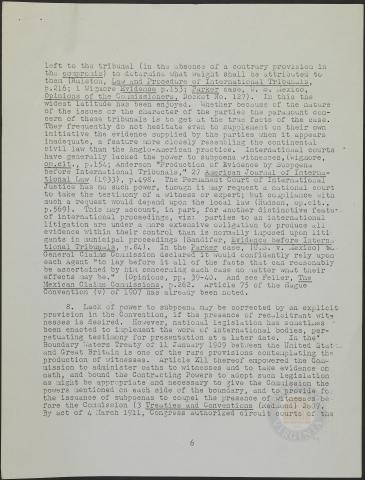
Page 6
| Parent | Perpetuation of testimony by Witnesses in U. S. for Presentation to the International Military Tribunal |
|---|---|
| Date | 18 June 1945 |
| Language | English |
| Collection | Tavenner Papers & IMTFE Official Records |
| Box | Box 3 |
| Folder | General Reports and Memoranda from June 1946 |
| Repository | University of Virginia Law Library |
left to the tribunal (in the absence of a contrary provision in the compromise) to determine what weight shall be attributed to them (Ralston, Law and Procedure of International Tribunals, p. 216; 1 Wigmore Evidence p. 152; Parker case, U. S. Mexico, Opinions of the Commissioners, Docket No. 127). In this the widest latitude has been enjoyed. Whether because of the nature of the issues or the character of the parties he paramount concern of these tribunals is to get at the true facts of the case. They frequently do not hesitate even to supplement on their own initiative the evidence supplied by the parties when it appears inadequate, a feature more closely resembling the continental civil law than the Anglo-American practice. International courts have generally lacked the power to subpoena witnesses, (Wigmore, op. cit., p. 154; Anderson “Production of Evidence by Subpoena before International Tribunals,” 27 American Journal of International Law (1933), p. 498. The Permanent Court of International Justice has no such power, though it may request a national court to take the testimony of a witness of expert; but compliance with such a request would depend upon the local law (Hudson, op. cit., p. 569). This may account, in part, for another distinctive feature of international proceedings, viz: parties to an international litigation are under a more extensive obligation to produce all evidence within their control than is normally imposed upon litigants in municipal proceedings (Sandifer, Evidence before International Tribunals, p. 84). In the Parker case, (U.S. v. Mexico) the General Claims Commission declared it would confidently rely upon each Agent “to lay before it all of the facts that can reasonably be ascertained by him concerning each case no matter what their effects may be.” (Opinions, pp. 39-40. And see Feller, the Mexican Claims Commission, p. 262. Article 75 of the Hague Convention (v) of 1907 has already been noted.
8. Lack of power to subpoena may be corrected by an explicit provision in the Convention, if the presence of recalcitrant witnesses is desired. However, national legislation has sometimes been enacted to implement the work of international bodies, perpetuating testimony for presentation at a later date. In the Boundary Waters Treaty of 11 January 1909 between the United States and Great Britain is one of the rare provisions contemplating the production fo witnesses. Article XII thereof empowered the Commission to administer oaths to witnesses and to take evidence on oath, and bound the Contracting Powers to adopt such legislation as might be appropriate and necessary to give the Commission the power mentioned on each side of the boundary, and to provide for the issuance of subpoenas to compel the presence of witnesses before the Commission (3 Treaties and Conventions (Redmond) 2607. By act of 4 March 1911, Congress authorized circuit courts of the
6
